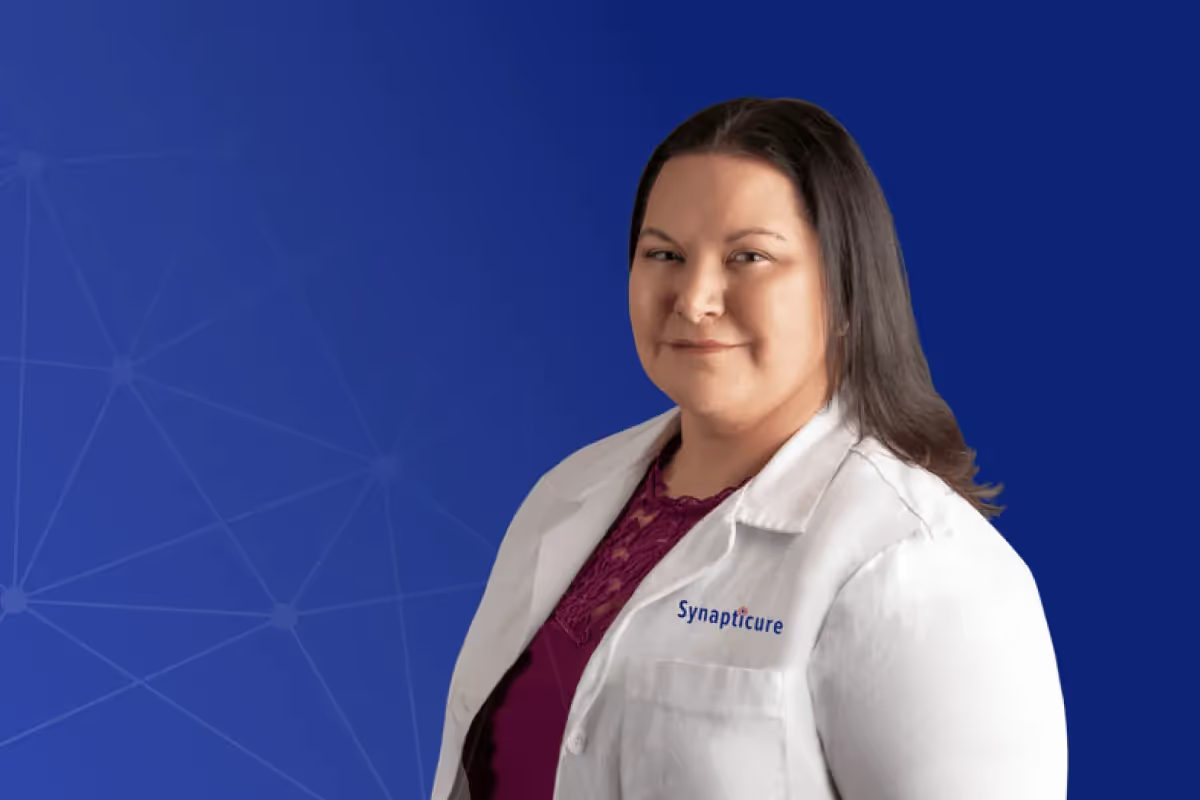At Synapticure, we understand that every journey with Parkinson’s disease is unique. That’s why our multidisciplinary team works closely with you and your loved ones to create personalized care plans that align with your goals and needs. We partner with your existing care teams and doctors to ensure continuity of care and provide the wraparound support you deserve.
Navigating Parkinson’s disease can feel overwhelming, but asking the right questions can help you understand your progression, available treatments, and relevant resources. Dr. Liz Ferluga provides the questions patients and caregivers should ask their neurologist about Parkinson’s disease.
These questions are just a starting point—your first visit will provide even more tailored guidance to help you manage Parkinson’s effectively.
What Are the Early Signs of Parkinson’s Disease?
Early signs often include:
- Tremors
- Stiffness
- Slowed movement
- Changes in posture
Non-motor symptoms such as sleep disturbances, loss of smell, or constipation can appear even decades before diagnosis. It’s important to contact your doctor if you’re noticing these symptoms. Our team can connect you with neurologists experienced in Parkinson’s care to support a diagnosis. We also partner with local and existing doctors to identify and address symptoms early.
Are There Lifestyle Changes to Slow Progression?
Yes! Two key factors are:
- Exercise: Staying active is a key part of managing symptoms and maintaining quality of life. Regular aerobic activity (150 minutes per week) may delay progression and help preserve cognition.
- Sleep: Poor sleep can negatively impact both physical and cognitive health.
Your Synapticure care team can provide you with the tools and care plans to facilitate lifestyle modifications, including exercise and sleep strategies, and collaborate with therapists and specialists to create plans tailored to you.
What Are the Available Treatment Options?
Parkinson’s treatments focus on symptom management. Options include:
- Medications: The gold standard is carbidopa/levodopa, which increases dopamine. Other options include monoamine oxidase Inhibitors and dopamine agonists.
- Advanced Therapies: These include Deep Brain Stimulation, Focused Ultrasound, and medication pumps.
- Rehabilitation: Occupational, physical, and speech therapies are vital for long-term management.
Synapticure will coordinate treatments, connect you with specialists, and ensure you have access to the latest advancements in Parkinson’s care, including accessing clinical trials and alternative therapies.
Does Parkinson’s Affect Mental Health?
Yes, mood disorders like depression and anxiety are common and often increase as the disease progresses. Treatment options include counseling, medication, and support groups.
Managing mental health is as important as addressing physical symptoms. Our Collaborative Mental Healthcare Program provides tailored mental and behavioral health support, reducing anxiety and depression symptoms while addressing your unique needs.
How Can I Support My Loved One as a Caregiver?
Caregiving requires both practical and emotional support. To help your loved one:
- Encourage regular exercise.
- Support a balanced diet.
- Ensure medications are taken as prescribed.
- Provide emotional reassurance.
Caregivers should also prioritize their own self-care and well-being to avoid burnout and mental health problems, like anxiety and depression. Synapticure offers caregivers and families resources to ease the burden of caregiving and improve their quality of life like Care Coordinators, insurance management, mental health support, and more. During your visit with Synapticure, ask about our caregiver support services and what may be available to you.
What Exercises Are Beneficial?
Certain exercises improve balance, flexibility, and strength, including walking, aerobics, boxing, Tai Chi, Yoga, and others.
Physical therapy can also provide personalized plans to address individual needs. Synapticure partners with local organizations to provide our patients with in-person or in-home physical therapy and occupational therapy to help maintain mobility and strength.
How Does Diet Impact Symptoms?
A healthy diet supports overall well-being. Recommendations include:
- Emphasizing fruits, vegetables, whole grains, and lean proteins (e.g., the Mediterranean diet).
- Timing carbidopa/levodopa medication 30–60 minutes before eating or 1–2 hours after meals to improve absorption.
Always consult your doctor before making dietary changes. Your Synapticure neurologist can provide dietary counseling and work with your care team to ensure that nutrition supports your treatment plan.
When Should I Consider Advanced Treatments?
If medications are no longer effective or side effects become challenging, it might be time to discuss advanced therapies like Deep Brain Stimulation or medication pumps with your neurologist.
Your Synapticure neurologist will guide you through the decision-making process, connect you with experts, and ensure you’re informed about the latest treatment options.
What Support and ResourcesAre Available?
Synapticure offers a range of resources, including:
- Expert neurologists
- Access to clinical trials and treatments
- Care coordination
- Speech therapy
- Genetic counseling
- Mental health services
- Insurance management
- Physical & Occupational therapy
Our wraparound care ensures you and your caregivers receive the support you deserve at every stage.
By addressing these questions with your neurologist and leveraging Synapticure’s personalized support, you can take proactive steps toward managing Parkinson’s disease. Click here to get started now.











.png)


